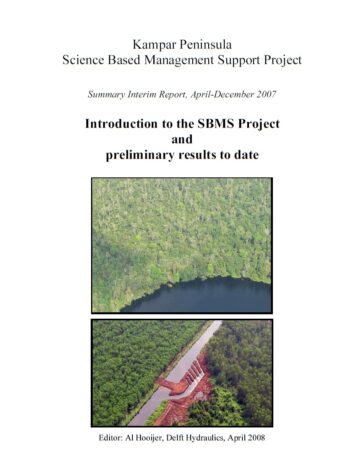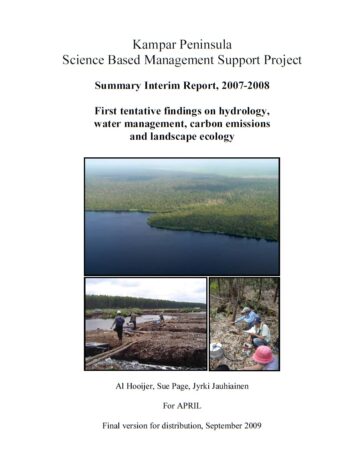
Kampar Peninsula Science Based Management Support Project: Summary Interim reports
-
Peatland conservation and restoration
Asia Pacific Resources International Limited (APRIL) is the second largest pulp and paper company of Indonesia and holds extensive drained plantations on peatlands. On the advice of Wetlands International, APRIL established a peatland expert advisory group to review the feasibility and sustainability of its plans to develop a ring of Acacia plantations on the Kampar Peninsula (the Kampar Ring), “safeguarding the inland peat swamp forest of the peninsula”. Wetlands International’s view was that the ‘ring’ of plantations could have disastrous impacts in the long term as a result of the off-site drainage impacts and soil subsidence.
The expert group appointed by APRIL was led by Deltares. They published, 7 and 8 years ago, the two summary reports below that have been approved by APRIL. The reports present scientific data that indicate that continued drainage will eventually lead to flooding of the plantations as peatland subsides due to peat oxidation and consolidation. This will also have major impacts on the adjacent peat swamp forests as drainage causes the watertables to drop over several kilometers into the forest. The reports recommend to protect entire peat domes from drainage which contests the “Kampar Ring” model as the whole of the Kampar Peninsula is a single peat dome.
The Kampar Science Based Management Support Project was instigated and funded by APRIL in line with its commitments to develop methods of sustainable peatland and water management that will reduce impacts in and around its plantations on the Kampar Peninsula. This is the Summary Interim Report, April-December 2007 approved by APRIL. The findings also led to two scientific publications: Subsidence and carbon loss in drained tropical peatlands and Carbon dioxide emissions from an Acacia plantation on peatland in Sumatra, Indonesia.
The Kampar Science Based Management Support Project was instigated and funded by APRIL in line with its commitments to develop methods of sustainable peatland and water management that will reduce impacts in and around its plantations on the Kampar Peninsula. This is the Summary Interim Report, 2007-2008 approved by APRIL, showing the first tentative findings on hydrology, water management, carbon emissions and landscape ecology.


